homepage news
Top 10 local stories of 2018
Hate crimes, election results and big changes to D.C. nightlife top our list
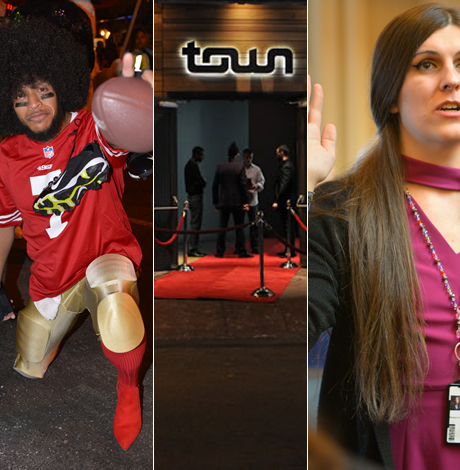
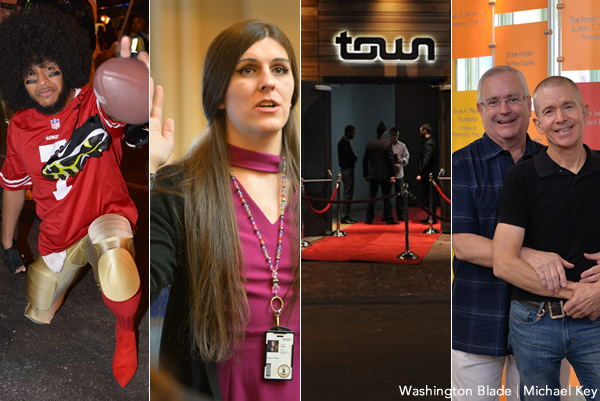
Hate crimes, election results and big changes to D.C. nightlife top our list for biggest local stories of 2018. (Washington Blade photos by Michael Key)
No. 10: Many LGBT tipped workers join effort to oppose Initiative 77
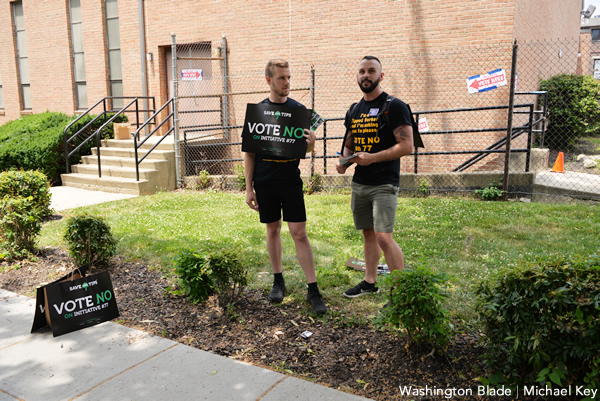
(Washington Blade photo by Michael Key)
A large number of LGBT servers, bartenders, and other tipped workers joined the restaurant industry’s campaign in the spring of 2018 to oppose a D.C. ballot initiative calling for ending the city’s tipped wage system.
The system, which is part of the city’s labor law, allows restaurants and other hospitality industry businesses to pay employees a lower minimum wage than that offered to non-tipped workers as long as tipped workers earn the equivalent of the full minimum wage through their tips. If the tips fall short of that the businesses are required to pay the difference.
D.C. voters in June approved the initiative, but the D.C. Council a short time later voted to overturn the measure under its legal authority to do so. Supporters of the initiative quickly organized a new ballot measure in the form of a referendum to “repeal” the Council repeal of Initiative 77.
In yet another twist and turn over the Initiative 77 battle, the restaurant industry association filed a lawsuit that resulted in a D.C. Superior Court judge in December halting the referendum on grounds that the D.C. Board of Elections failed to give sufficient public notice of a hearing in which the wording of the referendum was approved. Supporters of the initiative said they planned to appeal the judge’s ruling.
No. 9: Major changes to D.C.’s nightlife scene
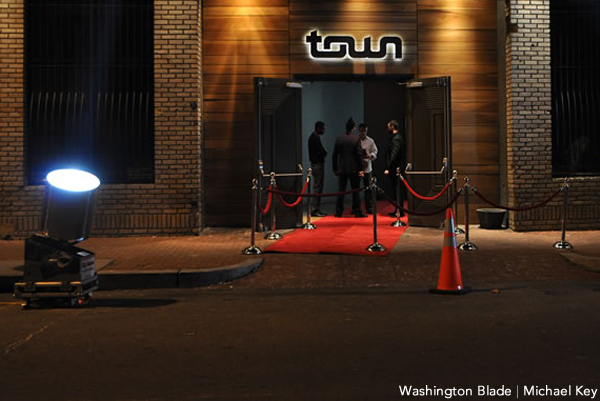
Town nightclub closed in 2018 but Pitchers quickly emerged as a new go-to nightspot. (Washington Blade file photo by Michael Key)
The closing of the popular D.C. gay dance club Town due to displacement by real estate development and the opening of a new dual gay sports bar Pitchers and its adjacent lesbian bar League of Her Own were among a number of changes in the D.C. and Baltimore area LGBT nightlife scenes in 2018.
Other changes included the sale of the buildings in which two D.C. gay bars have operated for many years – Bachelor’s Mill on 8th Street, S.E., near the Washington Navy Yard; and Cobalt at 17th and R streets, N.W. Both clubs have continued to operate as usual, but Bachelor’s Mill’s owner has declined to say whether the new owner plans to allow the club to remain in its building indefinitely.
Cobalt owner Eric Little has said Cobalt’s current lease lasts until 2021 and that he is uncertain what might happen after the lease runs out.
The start of 2018, just after New Year’s Day, marked the end of a two-year run of a Sunday night gay male strip club venue on Georgia Avenue, N.W. created by gay former D.C. Council member Jim Graham in partnership with the owner of The House, which hosted Graham’s Sunday night venue called Rock Hard. On all other nights The House continued its regular venue of female strippers for a straight clientele.
When Graham died suddenly in June 2017 from complications associated with an intestinal infection The House owner said he planned to continue the Sunday night Rock Hard venue. But regular customers said that without Graham’s guidance the clientele dropped off and owner Daryl Allen decided to discontinue the event in January.
Ownership and management changes saw the Baltimore Eagle close, though the owner has said the club will reopen. The Baltimore gay club Grand Central was sold in fall of 2018, with the new owner saying the club will remain ‘gay’ for the time being. In Rehoboth Beach, the Double L gay bar also changed ownership and reopened as Diego’s Hideaway.
No. 8: CAMP Rehoboth leader Steve Elkins dies at 67
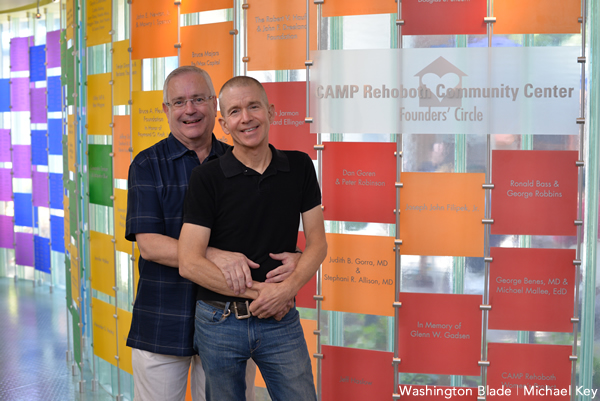
Steve Elkins (left) shown here with his husband Murray Archibald. (Washington Blade file photo by Michael Key)
LGBT people and their supporters who frequent the popular resort town of Rehoboth Beach, Del., in March mourned the loss of Steve Elkins, the co-founder and executive director of CAMP Rehoboth, an LGBT community services center.
Elkins, a widely recognized advocate for LGBT rights since the 1980s, died March 15 following a battle with lymphoma. He was 67.
“For over 25 years as its Executive Director, Steve’s leadership and vision has allowed CAMP Rehoboth to become one of the most respected and successful non-profit organizations in Delaware and has contributed greatly to establishing Rehoboth as a widely recognized community with ‘room for all,’” the organization stated on its Facebook page.
“As he did throughout his life, fighting for the rights of so many in this state, he fought lymphoma with courage and dignity until the very end,” the statement said.
Elkins’ passing followed an announcement made one month earlier in what became his last column in the Rehoboth magazine Letters From CAMP Rehoboth, in which he said he was taking a medical leave of absence and that his husband and life partner of 39 years, Murray Archibald, would serve as the organization’s interim executive director.
Archibald, who co-founded CAMP Rehoboth with Elkins, has since been named Elkins’ successor as the organization’s executive director.
“The evolution of Rehoboth Beach from a city where homophobia reared its evil head too frequently to a city that is truly accepting to all is largely the work of Steve Elkins,” said Delaware LGBT rights advocate and former Sussex County Democratic Party Chair Mitch Crane.
No. 7: Mayor Bowser ‘takes over’ high heel race
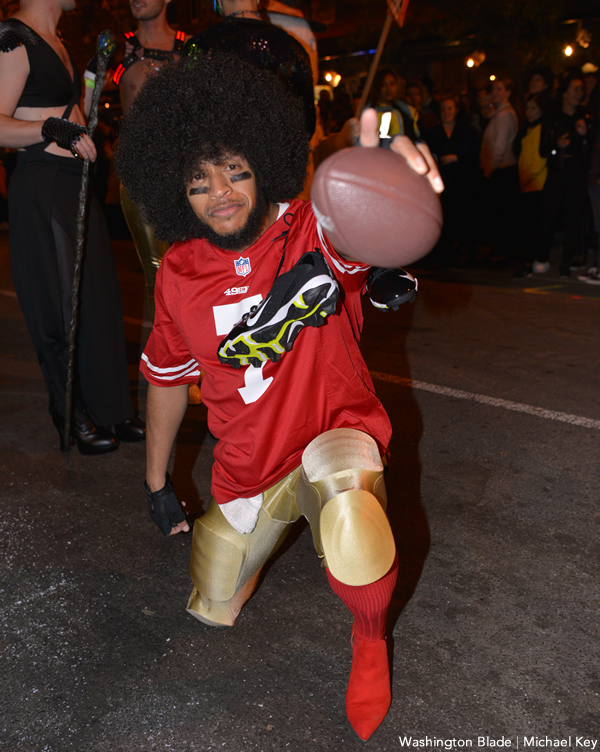
The 32nd annual High Heel Race was held on Frank Kameny Way on Tuesday, Oct. 30. (Washington Blade photo by Michael Key)
D.C. Mayor Muriel Bowser made official in mid-October what LGBT activists have said has been a developing trend during the past several years – that the D.C. government directed by the mayor’s office would be the official sponsor and organizer of the city’s 32nd Annual 17th Street High Heel Race.
For years the event has been one of the city’s most popular Halloween events, with thousands of people lining the street to watch as many as 100 drag queens racing down the street wearing a required pair of high heel shoes.
“The mayor was really excited about this when we talked about it a year ago because this shows her support of the LGBTQ community and its diversity,” said Sheila Alexander-Reid, director of the Mayor’s Office of LGBTQ Affairs.
“And I think this is going to go a long way toward making sure this event last and continue,” Alexander-Reid said. “I know Mayor Bowser loves this event and I know she’s proud to present it.”
The event took place Tuesday night, Oct. 30, with Bowser giving the official signal to start the race.
No. 6: Four gay men, one trans woman murdered in D.C.-Baltimore

Brendon Michaels was found dead in his Baltimore apartment on Nov. 8, 2018. Police have not made any arrests in connection with his murder. (Photo courtesy of Carroll Community College)
Two gay men in D.C., a gay man in Beltsville, Md., a gay man in Baltimore, and a transgender woman in Baltimore were victims of murder in 2018.
But police in each of those locations said they had yet to obtain evidence to show the victims were targeted because of their sexual orientation or gender identity. Arrests have been made in two of the five cases.
Meanwhile, D.C. police in early 2018 made three arrests for the Dec. 28, 2017 murder of lesbian Kerrice Lewis, 23, who was found shot to death in the trunk of her car that had been set on fire by one of the suspects arrested in the case.
D.C. police said the motive for her killing appeared to be a dispute between a group of friends. Police said they had no evidence to indicate Lewis was targeted because of her status as a lesbian.
Three men have been charged with first degree murder while armed in connection with her death. The three are being held without bond while awaiting trial.
The first of the five 2018 cases took place on March 14, when Antonio Barnes, 27, was fatally stabbed outside his residence in Beltsville. P.G. County police one month later charged Barnes’ boyfriend, Canaan Peterson, 23, with first degree murder, but prosecutors later allowed Peterson to plead guilty to a lower charge of first degree assault. Authorities said the case was an act of domestic violence and they didn’t believe Peterson, who stabbed Barnes in the upper leg, intended to kill him. Authorities said Barnes bled to death after the stab wound punctured an artery.
On March 14, gay D.C. resident Sean Anderson, 48, was found shot to death in his apartment on the 2300 block of Good Hope Rd., S.E. In April D.C. police charged Jerome Wilson, 35, an acquaintance of Anderson, with second degree murder. On July 21, District resident Michael Miller, 37, was found shot to death in an alley behind the 1600 block of Minnesota Ave., S.E. Police say no suspects and no motive have been identified in the case.
On Nov. 8, Brendon Michaels, 43, a fitness instructor at Carroll Community College, was found beaten to death in his apartment on the 1200 block of St. Paul Street in Baltimore. Police have no suspects and no known motive for his murder.
On Nov. 26, 37-year-old transgender woman Tydi Dansbury was found suffering from a gunshot wound to her body in the 1900 block of W. Lanvale Street in Baltimore, according to Baltimore police. She died two days later at a nearby hospital. Police say they have no suspects and no known motive in the case. They are seeking help from the public in their investigation into the murder.
No. 5: Md., Del. ban conversion therapy; Va. measure killed
Maryland and Delaware passed laws in 2018 that ban licensed mental health professionals from performing so-called conversion therapy for minors. Separate bills calling for banning the therapy for minors in Virginia died in committee in the state House and Senate.
In May, Republican Gov. Larry Hogan of Maryland signed into law a conversion therapy ban that had been passed at that time in D.C. and 11 other states. In July, Delaware Gov. John Carney (D) signed a similar bill approved by the Delaware Legislature.
LGBT activists in both states praised their governors and state lawmakers for enacting laws that they said would protect LGBT young people from the serious harms attributed to “therapy” seeking to change someone’s sexual orientation from gay to straight.
All of the mainline professional medical and mental health organizations, including the American Psychiatric Association and the American Medical Association, have warned that conversion therapy is ineffective to changing someone’s sexual orientation and has been found to cause harmful side effects such as depression, suicidal ideation.
In Virginia, Republican lawmakers tabled two bills in February calling for banning conversion therapy for minors in Virginia, effectively killing the bills for the legislature’s 2018 session. Supporters of the bills said they would reintroduce them in 2019.
No. 4: Matthew Shepard interred at National Cathedral
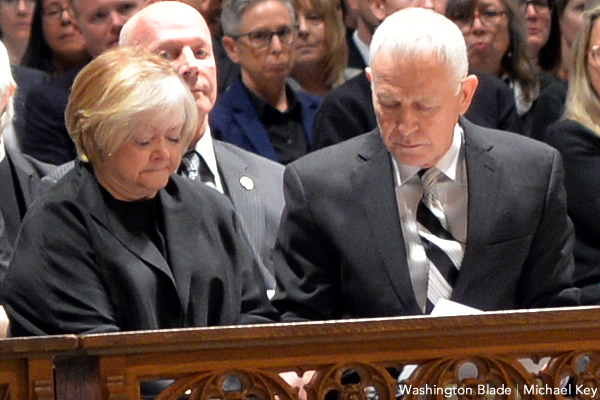
Judy and Dennis Shepard at Washington National Cathedral in D.C. on Oct. 26. Their son Matthew’s ashes were interred in the church’s crypt. (Washington Blade photo by Michael Key)
The ashes of Matthew Shepard were interred in the Washington National Cathedral’s crypt on Oct. 26 during a private ceremony following a service open to the public in the cathedral’s main hall, which was filled to capacity.
Shepard, a gay University of Wyoming student, died on Oct. 12, 1998, after being bludgeoned with the barrel of a pistol by Aaron McKinney and tied to a fence in a desolate field in Laramie, Wyo., by accomplice Russell Henderson in what has become known as one of the nation’s most notorious anti-gay hate crimes.
Matthew Shepard’s parents, Dennis and Judy Shepard, were among those who attended the National Cathedral service after announcing their decision to have their son laid to rest at the Cathedral 20 years after his passing. The two have become vocal advocates for LGBT rights and for efforts to pass hate crimes legislation nationally and in states across the country
“It’s so important that we have a home for Matt,” said Dennis Shepard before the interment. “A home that others can visit; a home that is safe from haters, a home that he loved dearly from his younger days in Sunday school and as an acolyte at his church back home.”
Retired New Hampshire Bishop V. Gene Robinson, who in 2003 became the first openly gay bishop in the Episcopal Church, delivered an emotional homily at the service.
“Gently rest in this place,” he said. “You are safe now…welcome home.”
No. 3: Six anti-gay assaults target gay men in D.C.
Gay men were the victims in at least six anti-gay assaults that occurred in D.C. in 2018 beginning in April. Arrests have been made in just two of the incidents.
The first took place April 15 at Vermont Ave. and U Street, N.W. at about 12:30 a.m. when three unidentified male suspects assaulted two gay men while shouting anti-gay names. Both men were hospitalized and treated for non-life threatening injuries. On May 20, two or three male suspects assaulted a gay man while yelling anti-gay names about 1 a.m. at Sherman Ave. and Harvard St., N.W.
On May 27 one unidentified male suspect shouted anti-gay names at two men walking on the sidewalk on the 1300 block of 14th St., N.W. about 6:30 p.m. The suspect punched one of the men in the face before fleeing the scene. On June 5, D.C. police arrested District resident Bertrand Lebeau Jr. for allegedly punching a male victim in the head and stomping on the victim’s cell phone while calling the victim a “faggot.” Lebeau was charge with simple assault and destruction of property.
On June 10 male suspect Uduak Iben was charged with simple assault and destruction of property for allegedly destroying LGBT Pride decorations displayed outside a pet store near the corner of 17th and R streets., N.W. and assaulting two of the store’s employees who tried to stop him from pulling down the decorations. He shouted “fuck gay people” while attacking the employees, according to a police report.
The last of the six incidents took place on Sept. 16 along the 2000 block of New Hampshire Avenue, N.W. near a D.C. police station. Four males and one female suspect jumped out of two vehicles and attacked and beat two gay men while shouting anti-gay slurs, a police report says. One of the victims was hospitalized. Both victims were wearing Stonewall Kickball T-shirts associated with a gay kickball league. No arrests have been made in the case.
No. 2: Danica Roem sworn in, makes history
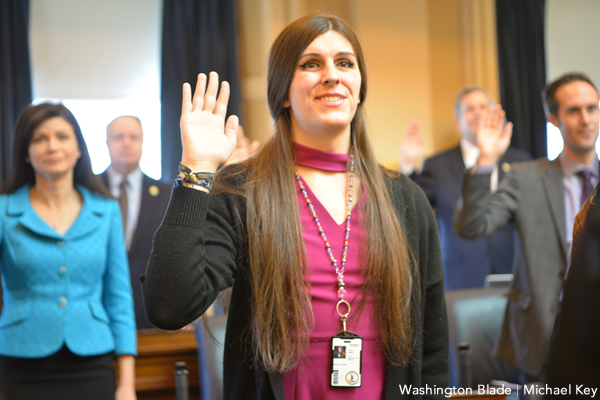
Danica Roem was sworn in on Jan. 10. (Washington Blade photo by Michael Key)
On Jan. 10, history was made when Danica Roem was sworn into office as a member of the Virginia House of Delegates from her district in Manassas to become the nation’s first transgender person to serve in a state legislature.
Roem, a Democrat, won election to the seat in November 2017 by defeating anti-LGBT incumbent Robert Marshall (R), who held the seat for more than two decades.
“While at first Danica received international attention because of her groundbreaking win, now she receives coverage because of her deep policy knowledge and the legislation she has advanced that improves the lives of Virginians,” said Ruben Gonzales, president of the LGBTQ Victory Institute, which supported Roem in her election campaign.
Roem has been credited with running a highly effective campaign by focusing on local issues that most impact the residents of her district, including traffic congestion and innovative ways to alleviate the free up clogged commuter roads and highways.
She has emerged as one of the Virginia General Assembly’s most outspoken advocates for LGBT equality.
No. 1: 2018 election results
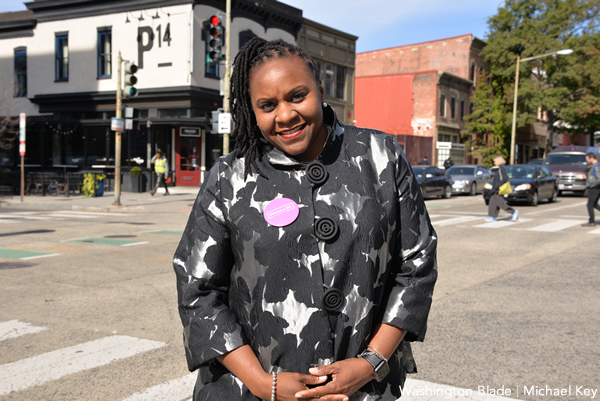
Dionne Reeder ran a spirited, but unsuccessful, campaign for City Council. (Washington Blade photo by Michael Key)
The so-called “rainbow wave” in which a record number of openly LGBT candidates won election to public office across the country on the state and national level in 2018 did not appear to reach D.C., Delaware, and Virginia.
In what some LGBT activists viewed as a disappointment, seven gay or lesbian candidates lost their races this year in D.C. for several key positions, including mayor, City Council member, attorney general, and the city’s congressional delegate seat.
But in what other activists view as a positive sign for LGBT equality, all of the incumbent public office holders that defeated the gay and lesbian candidates in D.C. have longstanding records of strong support for LGBT rights.
And while the seven gay and lesbian candidates lost their races for the more traditional positions such as mayor and D.C. Council seats, Ward 3 community activist Monika Nemeth broke new ground on Nov. 6 by becoming the first known transgender person to win election to a seat on one of the city’s Advisory Neighborhood Commissions.
Another 23 gay men or lesbians won election or re-election to 22 other ANC seats, which are unpaid positions with no powers other than to advise city officials on local community based issues such as trash collection and liquor license approval.
Among the LGBT supportive incumbents to win re-election to the D.C. Council was Elissa Silverman (I-At-Large) who defeated lesbian challenger and businesswoman Dionne Reeder, who also ran as an independent. Reeder was considered to have the best shot at winning among the other six gay candidates that lost, all of whom were men.
The remaining six non-ANC gay candidates that lost were Kent Boese, who challenged incumbent Council member Brianne Nadeau (D-Ward 1) in the Democratic primary; Jamie Sycamore, who challenged Nadeau as an independent in the general election; Libertarian Party activist Martin Moulton, who waged a longshot challenge to Mayor Muriel Bowser (D); and longshot Libertarian candidates Joe Henchman, who ran for Attorney General and his husband Ethan Bishop Henchman, who ran for D.C. Council Chair against incumbent Phil Mendelson (D-At-Large). Gay Libertarian Bruce Majors ran against D.C. Congressional Delegate Eleanor Holmes Norton (D). All six lost by wide margins.
In a similar development in Delaware, lesbian civic activist Kerri Evelyn Harris lost her Democratic primary challenge in September by a lopsided margin to incumbent U.S. Sen. Tom Carper, who has a record of strong support for LGBT rights. Gay Republican businessman Eugene Truono also threw his hat in the ring for Carper’s Senate seat but lost to challenger Rob Arlett in the Republican primary. Carper beat Arlett by a wide margin in the November general election.
In Virginia, no openly LGBT candidates surfaced in 2018 in the state’s congressional races. No candidates were up for election in the Virginia General Assembly in 2018.
In Maryland, three of the four incumbent openly gay or lesbian members of the Maryland House of Delegates – Bonnie Cullison (D-Montgomery County), Anne Kaiser (D-Montgomery County), and Luke Clippinger (D-Baltimore City) won re-election.
The fourth incumbent, lesbian Del. Mary Washington (D-Baltimore City), won election to the Maryland State Senate in a separate district in Baltimore City.
Also winning re-election was gay Howard County Register of Wills Byron Macfarlane, who will begin his new term in that position in January.
And in a development that continues Maryland’s status as a pre-existing “rainbow wave” state, gay civic activist Gabriel Acevery, a Democrat, won election to the House of Delegates in a District in Montgomery County. Acevery’s election continues Maryland’s status of having five openly gay or lesbian members in its state legislature, among the highest number of LGBT state lawmakers in the nation.
Meanwhile, three other LGBT candidates lost their races for seats in the Maryland Legislature in 2018. Transgender rights advocate Dana Beyer lost her bid for a State Senate seat in Montgomery County in the Democratic primary. The seat had been held by longtime gay incumbent Richard Madaleno (D), who gave up the seat in an unsuccessful race for governor.
Also losing their races in the Democratic primary for House of Delegate seats in Montgomery County were bisexual Mila Johns and gay candidate Kevin Mack.
homepage news
Honoring the legacy of New Orleans’ 1973 UpStairs Lounge fire
Why the arson attack that killed 32 gay men still resonates 50 years later

On June 23 of last year, I held the microphone as a gay man in the New Orleans City Council Chamber and related a lost piece of queer history to the seven council members. I told this story to disabuse all New Orleanians of the notion that silence and accommodation, in the face of institutional and official failures, are a path to healing.
The story I related to them began on a typical Sunday night at a second-story bar on the fringe of New Orleans’ French Quarter in 1973, where working-class men would gather around a white baby grand piano and belt out the lyrics to a song that was the anthem of their hidden community, “United We Stand” by the Brotherhood of Man.
“United we stand,” the men would sing together, “divided we fall” — the words epitomizing the ethos of their beloved UpStairs Lounge bar, an egalitarian free space that served as a forerunner to today’s queer safe havens.
Around that piano in the 1970s Deep South, gays and lesbians, white and Black queens, Christians and non-Christians, and even early gender minorities could cast aside the racism, sexism, and homophobia of the times to find acceptance and companionship for a moment.
For regulars, the UpStairs Lounge was a miracle, a small pocket of acceptance in a broader world where their very identities were illegal.
On the Sunday night of June 24, 1973, their voices were silenced in a murderous act of arson that claimed 32 lives and still stands as the deadliest fire in New Orleans history — and the worst mass killing of gays in 20th century America.
As 13 fire companies struggled to douse the inferno, police refused to question the chief suspect, even though gay witnesses identified and brought the soot-covered man to officers idly standing by. This suspect, an internally conflicted gay-for-pay sex worker named Rodger Dale Nunez, had been ejected from the UpStairs Lounge screaming the word “burn” minutes before, but New Orleans police rebuffed the testimony of fire survivors on the street and allowed Nunez to disappear.
As the fire raged, police denigrated the deceased to reporters on the street: “Some thieves hung out there, and you know this was a queer bar.”
For days afterward, the carnage met with official silence. With no local gay political leaders willing to step forward, national Gay Liberation-era figures like Rev. Troy Perry of the Metropolitan Community Church flew in to “help our bereaved brothers and sisters” — and shatter officialdom’s code of silence.
Perry broke local taboos by holding a press conference as an openly gay man. “It’s high time that you people, in New Orleans, Louisiana, got the message and joined the rest of the Union,” Perry said.
Two days later, on June 26, 1973, as families hesitated to step forward to identify their kin in the morgue, UpStairs Lounge owner Phil Esteve stood in his badly charred bar, the air still foul with death. He rebuffed attempts by Perry to turn the fire into a call for visibility and progress for homosexuals.
“This fire had very little to do with the gay movement or with anything gay,” Esteve told a reporter from The Philadelphia Inquirer. “I do not want my bar or this tragedy to be used to further any of their causes.”
Conspicuously, no photos of Esteve appeared in coverage of the UpStairs Lounge fire or its aftermath — and the bar owner also remained silent as he witnessed police looting the ashes of his business.
“Phil said the cash register, juke box, cigarette machine and some wallets had money removed,” recounted Esteve’s friend Bob McAnear, a former U.S. Customs officer. “Phil wouldn’t report it because, if he did, police would never allow him to operate a bar in New Orleans again.”
The next day, gay bar owners, incensed at declining gay bar traffic amid an atmosphere of anxiety, confronted Perry at a clandestine meeting. “How dare you hold your damn news conferences!” one business owner shouted.
Ignoring calls for gay self-censorship, Perry held a 250-person memorial for the fire victims the following Sunday, July 1, culminating in mourners defiantly marching out the front door of a French Quarter church into waiting news cameras. “Reverend Troy Perry awoke several sleeping giants, me being one of them,” recalled Charlene Schneider, a lesbian activist who walked out of that front door with Perry.

Esteve doubted the UpStairs Lounge story’s capacity to rouse gay political fervor. As the coroner buried four of his former patrons anonymously on the edge of town, Esteve quietly collected at least $25,000 in fire insurance proceeds. Less than a year later, he used the money to open another gay bar called the Post Office, where patrons of the UpStairs Lounge — some with visible burn scars — gathered but were discouraged from singing “United We Stand.”
New Orleans cops neglected to question the chief arson suspect and closed the investigation without answers in late August 1973. Gay elites in the city’s power structure began gaslighting the mourners who marched with Perry into the news cameras, casting suspicion on their memories and re-characterizing their moment of liberation as a stunt.
When a local gay journalist asked in April 1977, “Where are the gay activists in New Orleans?,” Esteve responded that there were none, because none were needed. “We don’t feel we’re discriminated against,” Esteve said. “New Orleans gays are different from gays anywhere else… Perhaps there is some correlation between the amount of gay activism in other cities and the degree of police harassment.”

An attitude of nihilism and disavowal descended upon the memory of the UpStairs Lounge victims, goaded by Esteve and fellow gay entrepreneurs who earned their keep via gay patrons drowning their sorrows each night instead of protesting the injustices that kept them drinking.
Into the 1980s, the story of the UpStairs Lounge all but vanished from conversation — with the exception of a few sanctuaries for gay political debate such as the local lesbian bar Charlene’s, run by the activist Charlene Schneider.
By 1988, the 15th anniversary of the fire, the UpStairs Lounge narrative comprised little more than a call for better fire codes and indoor sprinklers. UpStairs Lounge survivor Stewart Butler summed it up: “A tragedy that, as far as I know, no good came of.”
Finally, in 1991, at Stewart Butler and Charlene Schneider’s nudging, the UpStairs Lounge story became aligned with the crusade of liberated gays and lesbians seeking equal rights in Louisiana. The halls of power responded with intermittent progress. The New Orleans City Council, horrified by the story but not yet ready to take its look in the mirror, enacted an anti-discrimination ordinance protecting gays and lesbians in housing, employment, and public accommodations that Dec. 12 — more than 18 years after the fire.
“I believe the fire was the catalyst for the anger to bring us all to the table,” Schneider told The Times-Picayune, a tacit rebuke to Esteve’s strategy of silent accommodation. Even Esteve seemed to change his stance with time, granting a full interview with the first UpStairs Lounge scholar Johnny Townsend sometime around 1989.
Most of the figures in this historic tale are now deceased. What’s left is an enduring story that refused to go gently. The story now echoes around the world — a musical about the UpStairs Lounge fire recently played in Tokyo, translating the gay underworld of the 1973 French Quarter for Japanese audiences.
When I finished my presentation to the City Council last June, I looked up to see the seven council members in tears. Unanimously, they approved a resolution acknowledging the historic failures of city leaders in the wake of the UpStairs Lounge fire.
Council members personally apologized to UpStairs Lounge families and survivors seated in the chamber in a symbolic act that, though it could not bring back those who died, still mattered greatly to those whose pain had been denied, leaving them to grieve alone. At long last, official silence and indifference gave way to heartfelt words of healing.
The way Americans remember the past is an active, ongoing process. Our collective memory is malleable, but it matters because it speaks volumes about our maturity as a people, how we acknowledge the past’s influence in our lives, and how it shapes the examples we set for our youth. Do we grapple with difficult truths, or do we duck accountability by defaulting to nostalgia and bluster? Or worse, do we simply ignore the past until it fades into a black hole of ignorance and indifference?
I believe that a factual retelling of the UpStairs Lounge tragedy — and how, 50 years onward, it became known internationally — resonates beyond our current divides. It reminds queer and non-queer Americans that ignoring the past holds back the present, and that silence is no cure for what ails a participatory nation.
Silence isolates. Silence gaslights and shrouds. It preserves the power structures that scapegoat the disempowered.
Solidarity, on the other hand, unites. Solidarity illuminates a path forward together. Above all, solidarity transforms the downtrodden into a resounding chorus of citizens — in the spirit of voices who once gathered ‘round a white baby grand piano and sang, joyfully and loudly, “United We Stand.”

Robert W. Fieseler is a New Orleans-based journalist and the author of “Tinderbox: the Untold Story of the Up Stairs Lounge Fire and the Rise of Gay Liberation.”
homepage news
New Supreme Court term includes critical LGBTQ case with ‘terrifying’ consequences
Business owner seeks to decline services for same-sex weddings

The U.S. Supreme Court, after a decision overturning Roe v. Wade that still leaves many reeling, is starting a new term with justices slated to revisit the issue of LGBTQ rights.
In 303 Creative v. Elenis, the court will return to the issue of whether or not providers of custom-made goods can refuse service to LGBTQ customers on First Amendment grounds. In this case, the business owner is Lorie Smith, a website designer in Colorado who wants to opt out of providing her graphic design services for same-sex weddings despite the civil rights law in her state.
Jennifer Pizer, acting chief legal officer of Lambda Legal, said in an interview with the Blade, “it’s not too much to say an immeasurably huge amount is at stake” for LGBTQ people depending on the outcome of the case.
“This contrived idea that making custom goods, or offering a custom service, somehow tacitly conveys an endorsement of the person — if that were to be accepted, that would be a profound change in the law,” Pizer said. “And the stakes are very high because there are no practical, obvious, principled ways to limit that kind of an exception, and if the law isn’t clear in this regard, then the people who are at risk of experiencing discrimination have no security, no effective protection by having a non-discrimination laws, because at any moment, as one makes their way through the commercial marketplace, you don’t know whether a particular business person is going to refuse to serve you.”
The upcoming arguments and decision in the 303 Creative case mark a return to LGBTQ rights for the Supreme Court, which had no lawsuit to directly address the issue in its previous term, although many argued the Dobbs decision put LGBTQ rights in peril and threatened access to abortion for LGBTQ people.
And yet, the 303 Creative case is similar to other cases the Supreme Court has previously heard on the providers of services seeking the right to deny services based on First Amendment grounds, such as Masterpiece Cakeshop and Fulton v. City of Philadelphia. In both of those cases, however, the court issued narrow rulings on the facts of litigation, declining to issue sweeping rulings either upholding non-discrimination principles or First Amendment exemptions.
Pizer, who signed one of the friend-of-the-court briefs in opposition to 303 Creative, said the case is “similar in the goals” of the Masterpiece Cakeshop litigation on the basis they both seek exemptions to the same non-discrimination law that governs their business, the Colorado Anti-Discrimination Act, or CADA, and seek “to further the social and political argument that they should be free to refuse same-sex couples or LGBTQ people in particular.”
“So there’s the legal goal, and it connects to the social and political goals and in that sense, it’s the same as Masterpiece,” Pizer said. “And so there are multiple problems with it again, as a legal matter, but also as a social matter, because as with the religion argument, it flows from the idea that having something to do with us is endorsing us.”
One difference: the Masterpiece Cakeshop litigation stemmed from an act of refusal of service after owner, Jack Phillips, declined to make a custom-made wedding cake for a same-sex couple for their upcoming wedding. No act of discrimination in the past, however, is present in the 303 Creative case. The owner seeks to put on her website a disclaimer she won’t provide services for same-sex weddings, signaling an intent to discriminate against same-sex couples rather than having done so.
As such, expect issues of standing — whether or not either party is personally aggrieved and able bring to a lawsuit — to be hashed out in arguments as well as whether the litigation is ripe for review as justices consider the case. It’s not hard to see U.S. Chief Justice John Roberts, who has sought to lead the court to reach less sweeping decisions (sometimes successfully, and sometimes in the Dobbs case not successfully) to push for a decision along these lines.
Another key difference: The 303 Creative case hinges on the argument of freedom of speech as opposed to the two-fold argument of freedom of speech and freedom of religious exercise in the Masterpiece Cakeshop litigation. Although 303 Creative requested in its petition to the Supreme Court review of both issues of speech and religion, justices elected only to take up the issue of free speech in granting a writ of certiorari (or agreement to take up a case). Justices also declined to accept another question in the petition request of review of the 1990 precedent in Smith v. Employment Division, which concluded states can enforce neutral generally applicable laws on citizens with religious objections without violating the First Amendment.
Representing 303 Creative in the lawsuit is Alliance Defending Freedom, a law firm that has sought to undermine civil rights laws for LGBTQ people with litigation seeking exemptions based on the First Amendment, such as the Masterpiece Cakeshop case.
Kristen Waggoner, president of Alliance Defending Freedom, wrote in a Sept. 12 legal brief signed by her and other attorneys that a decision in favor of 303 Creative boils down to a clear-cut violation of the First Amendment.
“Colorado and the United States still contend that CADA only regulates sales transactions,” the brief says. “But their cases do not apply because they involve non-expressive activities: selling BBQ, firing employees, restricting school attendance, limiting club memberships, and providing room access. Colorado’s own cases agree that the government may not use public-accommodation laws to affect a commercial actor’s speech.”
Pizer, however, pushed back strongly on the idea a decision in favor of 303 Creative would be as focused as Alliance Defending Freedom purports it would be, arguing it could open the door to widespread discrimination against LGBTQ people.
“One way to put it is art tends to be in the eye of the beholder,” Pizer said. “Is something of a craft, or is it art? I feel like I’m channeling Lily Tomlin. Remember ‘soup and art’? We have had an understanding that whether something is beautiful or not is not the determining factor about whether something is protected as artistic expression. There’s a legal test that recognizes if this is speech, whose speech is it, whose message is it? Would anyone who was hearing the speech or seeing the message understand it to be the message of the customer or of the merchants or craftsmen or business person?”
Despite the implications in the case for LGBTQ rights, 303 Creative may have supporters among LGBTQ people who consider themselves proponents of free speech.
One joint friend-of-the-court brief before the Supreme Court, written by Dale Carpenter, a law professor at Southern Methodist University who’s written in favor of LGBTQ rights, and Eugene Volokh, a First Amendment legal scholar at the University of California, Los Angeles, argues the case is an opportunity to affirm the First Amendment applies to goods and services that are uniquely expressive.
“Distinguishing expressive from non-expressive products in some contexts might be hard, but the Tenth Circuit agreed that Smith’s product does not present a hard case,” the brief says. “Yet that court (and Colorado) declined to recognize any exemption for products constituting speech. The Tenth Circuit has effectively recognized a state interest in subjecting the creation of speech itself to antidiscrimination laws.”
Oral arguments in the case aren’t yet set, but may be announced soon. Set to defend the state of Colorado and enforcement of its non-discrimination law in the case is Colorado Solicitor General Eric Reuel Olson. Just this week, the U.S. Supreme Court announced it would grant the request to the U.S. solicitor general to present arguments before the justices on behalf of the Biden administration.
With a 6-3 conservative majority on the court that has recently scrapped the super-precedent guaranteeing the right to abortion, supporters of LGBTQ rights may think the outcome of the case is all but lost, especially amid widespread fears same-sex marriage would be next on the chopping block. After the U.S. Tenth Circuit Court of Appeals ruled against 303 Creative in the lawsuit, the simple action by the Supreme Court to grant review in the lawsuit suggests they are primed to issue a reversal and rule in favor of the company.
Pizer, acknowledging the call to action issued by LGBTQ groups in the aftermath of the Dobbs decision, conceded the current Supreme Court issuing the ruling in this case is “a terrifying prospect,” but cautioned the issue isn’t so much the makeup of the court but whether or not justices will continue down the path of abolishing case law.
“I think the question that we’re facing with respect to all of the cases or at least many of the cases that are in front of the court right now, is whether this court is going to continue on this radical sort of wrecking ball to the edifice of settled law and seemingly a goal of setting up whole new structures of what our basic legal principles are going to be. Are we going to have another term of that?” Pizer said. “And if so, that’s terrifying.”
homepage news
Kelley Robinson, a Black, queer woman, named president of Human Rights Campaign
Progressive activist a veteran of Planned Parenthood Action Fund

Kelley Robinson, a Black, queer woman and veteran of Planned Parenthood Action Fund, is to become the next president of the Human Rights Campaign, the nation’s leading LGBTQ group announced on Tuesday.
Robinson is set to become the ninth president of the Human Rights Campaign after having served as executive director of Planned Parenthood Action Fund and more than 12 years of experience as a leader in the progressive movement. She’ll be the first Black, queer woman to serve in that role.
“I’m honored and ready to lead HRC — and our more than three million member-advocates — as we continue working to achieve equality and liberation for all Lesbian, Gay, Bisexual, Transgender, and Queer people,” Robinson said. “This is a pivotal moment in our movement for equality for LGBTQ+ people. We, particularly our trans and BIPOC communities, are quite literally in the fight for our lives and facing unprecedented threats that seek to destroy us.”
The next Human Rights Campaign president is named as Democrats are performing well in polls in the mid-term elections after the U.S. Supreme Court overturned Roe v. Wade, leaving an opening for the LGBTQ group to play a key role amid fears LGBTQ rights are next on the chopping block.
“The overturning of Roe v. Wade reminds us we are just one Supreme Court decision away from losing fundamental freedoms including the freedom to marry, voting rights, and privacy,” Robinson said. “We are facing a generational opportunity to rise to these challenges and create real, sustainable change. I believe that working together this change is possible right now. This next chapter of the Human Rights Campaign is about getting to freedom and liberation without any exceptions — and today I am making a promise and commitment to carry this work forward.”
The Human Rights Campaign announces its next president after a nearly year-long search process after the board of directors terminated its former president Alphonso David when he was ensnared in the sexual misconduct scandal that led former New York Gov. Andrew Cuomo to resign. David has denied wrongdoing and filed a lawsuit against the LGBTQ group alleging racial discrimination.




















